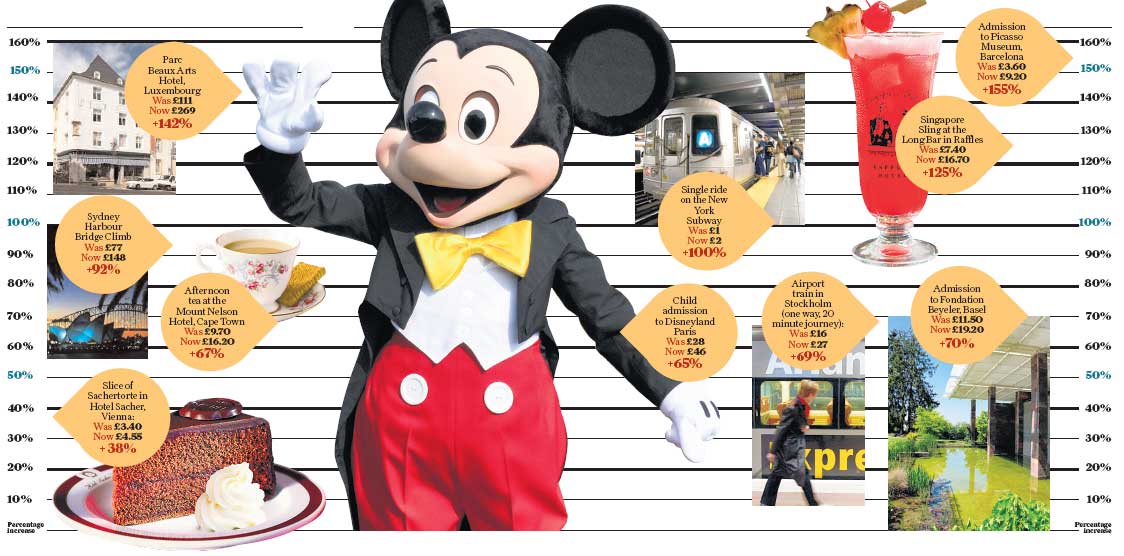The Holiday Crunch: Why you'll have to pack more pounds
Simon Calder reports on how sterling's fall is causing a rise in the price of foreign travel

As the peak summer season gets under way, British holidaymakers venturing abroad will discover dramatic price increases for everything from transport to theme-park admission.
Research by The Independent reveals the startling effects of the slump in sterling combined with steep price rises abroad. With many items now double the cost, in UK pounds, compared with three summers ago, British travellers face holiday hyperinflation.
Until sterling began its slide in the second half of 2008, British holidaymakers could indulge in treats such as afternoon tea in the sumptuous surroundings of the Mount Nelson in Cape Town, or a Singapore Sling at the Long Bar of the Raffles Hotel, with barely a glance at the bill: £9.70 and £7.40 respectively. But a combination of a modest price rise and the slump in sterling have combined to push the price of afternoon tea up by two-thirds, while a drink in the shadow of Somerset Maugham has more than doubled; buy a round of six, and the bill tops £100
The foreign currency that affects the highest number of British travellers is the euro. The tourist rate for the pound has fallen from €1.40 in 2008 to €1.08 yesterday. Arithmetic is cruel to currencies in decline: this corresponds to a 30 per cent increase in prices expressed in sterling – assuming zero inflation in the destination country. But prices have risen across the euro zone. The deliciously intense Sachertorte, the rich cake served in the historic Sacher Hotel in Vienna, has had only one small price rise in the past three years, but the fall in the value of sterling means that a serving now takes up a bigger slice of weekending Brits' expenditure: a gateau gap of 38 per cent has opened up. And this summer, the cost of a child's admission to Disneyland Paris is 70 per cent higher, at £46. A single night in a room for a family of four at the main hotel at the French theme park, together with breakfast and admission on two days, now tops £1,000.
Going west will not help stretch the traveller's pounds. For a time in 2007-08, British travellers grew accustomed to receiving two American dollars for each £1. Yesterday the tourist rate was $1.55 for online buyers – and even less, $1.48, at Post Offices on the high street.
The US dollar is the main denomination for aviation, with everything from fuel to aircraft leases priced in American currency. That is one reason long-haul air fares this summer have soared. British Airways is selling Gatwick-Orlando returns in early August for £1,250, while the cheapest Heathrow-New York return trip for the first weekend in August is £725. That is around one-third higher than the corresponding fare in the summer of 2008 – and the weekender will also feel the pinch on the city's Subway system. A single journey has doubled in sterling terms.
Other currencies have made even more handsome gains against the pound. The strong Swedish krona means that British visitors get their first shock when they buy a train ticket from Stockholm airport into town: the 20-minute ride costs £27. The Swiss franc was yesterday being sold at only Sfr1.25 to the pound at the Post Office, or 1.30 online. Admission to the leading collection of art in Basel, the Fondation Beyeler, has risen in price by 70 per cent in three years.
The sharpest increases in sterling terms are for purchases that were under-priced in 2008 relative to the market. The elegant Parc Beaux Arts Hotel in Luxembourg was selling rooms in July of that summer for as little as £111, while the rate for this month is £269 – a rise of 142 per cent. In Barcelona, the Picasso Museum was a real bargain three years ago at €5; it now costs twice as much in euro terms, which is probably about right, but repeat visitors from the UK will find they are paying 155 per cent more. Increasingly, British tourists are likely to seek out legal ways to dodge admission charges: at the Picasso Museum, admission is free every Sunday after 3pm.
Australia always figures high in surveys of dream destinations for Brits, but with the rate for Aussie dollars as poor as $1.37 to the pound yesterday, it could turn into a financial nightmare. The exciting climb across the iconic Sydney Harbour Bridge has virtually doubled in price.
The most remarkable aspect of holiday hyperinflation is that it has done little to dull the British appetite to travel. London remains the world hub of aviation, and the UK market is so important that destinations across the planet are working feverishly to construct deals to lure us abroad.
Don't despair – there are still bargains out there...
*Greece: Last night Thomson had one room remaining for a £223 one-week self-catering holiday to Kefalonia, above, departing next Thursday, 14 July. Even when this is sold, there are plenty of similarly priced packages to Greece.
*France: SeaFrance has plenty of £70 return tickets available for a car and its occupants between Dover and Calais. The deal even includes travelling out and back on peak summer Saturdays. Take a tent and hope for fine weather.
*Poland: The Polish Riviera stretching along the Baltic coast, is Europe's unsung bargain destination. Ryanair has plenty of availability at £120 return from Stansted to Gdansk. Once there, prices are typically half as much as the eurozone for anything from hotels to ice cream.
Join our commenting forum
Join thought-provoking conversations, follow other Independent readers and see their replies
Comments
Bookmark popover
Removed from bookmarks